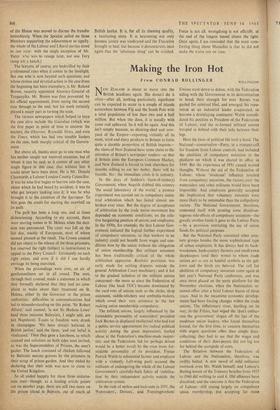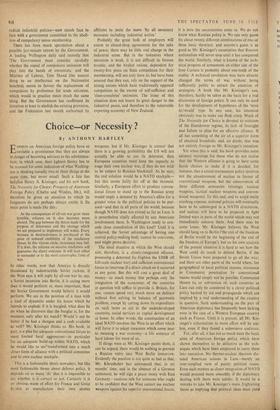Making the Iron Hot
WELL INGTON
From CONRAD BOLLINGER
NEW ZEALAND is about to move into the British headlines again. She doesn't do it often—after all, nothing particularly significant can be expected to occur in a couple of islands somewhere between Fiji and the South Pole with a total population of less than two and a half million. But when she does, it is usually with some real upheaval. So it will be again. And this isn't simply because, as shearing-shed and cow- yard of the Empire—exporting virtually all its meat, wool and dairy products to Britain to form quite a sizeable proportion of British imports— the views of New Zealand have some claim to the attention of Britain's newspaper readers--so that if Britain joins the European Common Market, and New Zealand is forced to look elsewhere for mouths willing to eat her butter, there will be trouble. No: the immediate crisis is in industry.
In the days of Seddon's (turn-of-century) Government, when Asquith dubbed this country 'the social laboratory of the world,' a pioneer experiment was carried out in compulsory indus- trial arbitration which has lasted almost un- broken ever since. But the degree of acceptance of arbitration by the trade union movement has depended on economic conditions; on the rela- tive bargaining position of unions and employers. In the 1930s, for example, the first Labour Gov- ernment initiated the logical further experiment of compulsory unionism, so that workers in an industry could not benefit from wages and con- ditions won by the union without the obligation of union membership. But militant unionism has been traditionally critical of the whole arbitration apparatus. Realistic provision was early made for settling disputes outside the general Arbitration Court machinery; and it led to the gradual isolation of the militant unions concerned—the more so since the Federation of Labour (the local TUC) became dominated by the card-vote of unions such as the clerks, shop assistants, saddle-stitchers and umbrella-makers, which owed their very existence to the law making union membership compulsory.
The militant unions, largely influenced by the formidable personality of watersiders' president Jock Barnes (a displaced intellectual who had lost a public service appointment for radical political activity during the great depression), hurled abuse at the Federation's machine-made majori- ties; and the Federation, led (or perhaps driven would be a better word) by the even more for- midable personality of its president, Fintan Patrick Walsh (a substantial farmer and employer with a violently Left-wing past) accused the militants of endangering the whole of the Labour Government's carefully-built fabric of 'stabilisa- tion' by their independent activity outside the arbitration system.
In the rash of strikes and lock-outs in 1951, the Watersiders', Drivers', and Freezingworkers'
Unions went down to defeat, with the Federation siding with the Government in its determination to break their strength for ever. Barnes was gaoled for criminal libel, and emerged, his repu- tation as an industrial leader evaporated, to become a drainlaying contractor. Walsh consoli- dated his position as President of the Federation of Labour, and the re-formed militant unions trooped in behind with their tails between their legs.
Here the facts of political life took a hand. The National—conservative—Party, in a trumpet-call for freedom from Labour controls, had included the abolition of compulsory unionism in the platform on which it was elected to office in 1949. But the experience of 1951 caused second thoughts. Without the aid of the Federation of Labour, whose 'moderate' influence resulted from compulsory unionism, the victory over the watersiders and other militants would have been impossible. And employers generally accepted the implication that voluntary unionists were more likely to be untamable than the compulsory variety. The National Government, therefore, contented itself with pruning some disadvan- tageous side-effects of compulsory unionism--the greatly swollen funds it gave to the Labour Party —by a provision restricting the use of union funds for political purposes.
But the National Party contained other pres- sure groups besides the more sophisticated type of urban employers. It has always had its back- woodsmen, bush-country farmers and small-town shopkeepers (and their wives) to whom trade unions per se are as hateful symbols as the gal- lows and the birch are beloved. The call for abolition of compulsory unionism came again at last year's National Party conference, and was once more placed on the party platform for the November elections, when the Nationalists re- sumed office after a brief Labour hiatus of three years. And in the meantime economic develop- ments had been forcing changes within the trade unions. The inflationary river, hurtling on its way, in the Fifties, had wiped the 'don't embar- rass the government' slogan off the lips of the moderate union leaders, who found themselves forced, for the first time, to concern themselves with urgent questions other than simple dues- collecting; they had to see that the wages and conditions of their dues-payers did not lag too far behind the stampede of costs.
The flirtation between the Federation of Labour and the Nationalists, therefore, was swiftly halted. A new mood of mild militancc overtook even Mr. Walsh himself, and Labour's fleeting tenure of the Treasury benches from 1957 to 1960 did nothing to cool it. Old alliances have dissolved; and the outcome is that the Federation of Labour—still resting largely on compulsory union membership, but accepting far more
radical industrial policies—now stands face to face with a government committed to the aboli- tion of compulsory union membership.
There has been much speculation about a possible last-minute retreat by the Government. A leading Wellington daily said recently that `The Government must consider carefully whether the repeal of compulsory unionism will play into the hands of extremists,' and the Minister of Labour, Tom Shand (the nearest thing to an intellectual on the Nationalist benches), seems to favour the replacement of compulsion by preference for trade unionists, which would in practice mean much the same thing. But the Government has reaffirmed its intention at least to abolish the existing provision, and the Federation last month authorised its affiliates to resist the move `by all necessary measures including industrial action.'
Probably the great bulk of employers will assent to closed-shop agreements for the sake of peace; there may be little real change in the industrial scene. But in the industries where unionism is weak, it is not difficult to foresee trouble; and the weaker unions, dependent for twenty-five years on State compulsion for their membership, will not only have to, but have been assured that they can, rely on the support of the strong unions which have traditionally opposed compulsion as the enemy of self-sufficient and `class-conscious' unionism. The irony of this situation does not lessen its great danger to the industrial peace, and therefore to the vulnerable exporting economy of New Zealand.











































 Previous page
Previous page